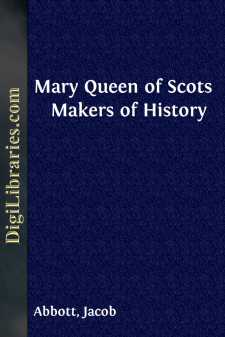Non-Classifiable
- Non-Classifiable 1768
Non-Classifiable Books
Sort by:
by:
John Spargo
THE MARX HE KNEW I The pale, yellow light of the waning day streamed through the dusty window panes of the little cigar shop, and across the bench where old Hans Fritzsche worked and hummed the melody of Der Freiheit the while. The Young Comrade who sat in the corner upon a three-legged stool seemed not to hear the humming. His eyes were fixed upon a large photograph of a man which hung in a massive...
more...
by:
Jacob Abbott
Mary's Childhood. 1542-1548 Travelers who go into Scotland take a great interest in visiting, among other places, a certain room in the ruins of an old palace, where Queen Mary was born. Queen Mary was very beautiful, but she was very unfortunate and unhappy. Every body takes a strong interest in her story, and this interest attaches, in some degree, to the room where her sad and sorrowful life...
more...
by:
Myrtle Reed
Concerning Women In order to be happy, a woman needs only a good digestion, a satisfactory complexion, and a lover. The first requirement being met, the second is not difficult to obtain, and the third follows as a matter of course.NaggingHe was a wise philosopher who first considered crime as disease, for women are naturally sweet-tempered and charming. The shrew and the scold are to be reformed only...
more...
GENERAL PREFACE TO THE SERIES If there is one quality which more than another marks the demand of the present day it is the requirement of novelty. In every direction the question which is asked is not, "Is this fresh thing good? Is it appropriate to, and well-fitted for, its intended uses?" but "Is it novel?" And the constant change of fashion sets a premium upon the satisfaction of...
more...
by:
Madeleine Black
United States New York, with over 5,000,000 inhabitants, has no effective market system. The buildings are out of repair, there is little or no organization, and the superintendent has testified before the New York Food Investigation Commission (March 12, 1912) that on their administration last year there was a loss to the city treasury of $80,000. To that must be added due consideration of the...
more...
[The following pages are, with slight changes, a reprint from the Proceedings of the Massachusetts Historical Society, of a paper read before that Society, March 8, 1883, in answer to a question propounded at a previous meeting, relative to the authenticity of the tradition that a woman was burned to death in Massachusetts in the year 1755. As this case is the only known instance of the infliction of...
more...
Chapter 1. Introduction—The Huguenots in South Carolina. The name of FRANCIS MARION is identified, in the history of South Carolina, his parent state, with all that is pleasing and exciting in romance. He is, par excellence, the famous partisan of that region. While Sumter stands conspicuous for bold daring, fearless intrepidity and always resolute behavior; while Lee takes eminent rank as a gallant...
more...
by:
Queen Marguerite
CHARLES, COMTE DE VALOIS, was the younger brother of Philip the Fair, and therefore uncle of the three sovereigns lately dead. His eldest son Philip had been appointed guardian to the Queen of Charles IV.; and when it appeared that she had given birth to a daughter, and not a son, the barons, joining with the notables of Paris and the, good towns met to decide who was by right the heir to the throne,...
more...
CHAPTER I. Importance of Marie Antoinette in the Revolution.—Value of herCorrespondence as a Means of estimating her Character.—Her Birth,November 2d, 1755.—Epigram of Metastasio.—Habits of the ImperialFamily.—Schönbrunn.—Death of the Emperor.—Projects for the Marriage ofthe Archduchess.—Her Education.—The Abbé de Vermond.—Metastasio.—Gluck. The most striking event in the annals...
more...
by:
Queen Marguerite
The Memoirs, of which a new translation is now presented to the public, are the undoubted composition of the celebrated princess whose name they bear, the contemporary of our Queen Elizabeth; of equal abilities with her, but of far unequal fortunes. Both Elizabeth and Marguerite had been bred in the school of adversity; both profited by it, but Elizabeth had the fullest opportunity of displaying her...
more...









![Memoirs of Marguerite de Valois - Volume 3 [Court memoir series]](https://digilibraries-com.s3.eu-central-1.amazonaws.com/covers/0737da06-4ac9-4269-bf54-5d6510f8d30e.jpg)

![Memoirs of Marguerite de Valois - Volume 1 [Court memoir series]](https://digilibraries-com.s3.eu-central-1.amazonaws.com/covers/b5b84e75-1406-48e1-a7a9-59247d820aed.jpg)